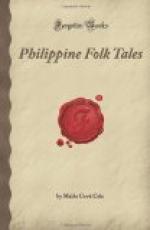“Crocodile is coming! Crocodile is coming!”
The monkey was so startled at the cry that he fell upon the sharp bamboo and was killed.
Then the turtle cut the dead monkey into pieces, put salt on it, and dried it in the sun. The next day, he went to the mountains and sold his meat to other monkeys who gladly gave him squash in return. As he was leaving them he called back:
“Lazy fellows, you are now eating your own body; you are now eating your own body.”
Then the monkeys ran and caught him and carried him to their own home.
“Let us take a hatchet,” said one old monkey, “and cut him into very small pieces.”
But the turtle laughed and said: “That is just what I like, I have been struck with a hatchet many times. Do you not see the black scars on my shell?”
Then one of the other monkeys said: “Let us throw him into the water,”
At this the turtle cried and begged them to spare his life, but they paid no heed to his pleadings and threw him into the water. He sank to the bottom, but very soon came up with a lobster. The monkeys were greatly surprised at this and begged him to tell them how to catch lobsters.
“I tied one end of a string around my waist,” said the turtle. “To the other end of the string I tied a stone so that I would sink.”
The monkeys immediately tied strings around themselves as the turtle said, and when all was ready they plunged into the water never to come up again.
And to this day monkeys do not like to eat meat, because they remember the ancient story. [149]
The Poor Fisherman and His Wife
Ilocano
Many, many years ago a poor fisherman and his wife lived with their three sons in a village by the sea. One day the old man set his snare in the water not far from his house, and at night when he went to look at it, he found that he had caught a great white fish. This startled the old man very much, for he had never seen a fish like this before, and it occurred to him that it was the priest of the town.
He ran to his wife as fast as he could and cried:
“My wife, I have caught the priest.”
“What?” said the old woman, terrified at the sight of her frightened husband.
“I have caught the priest,” said the old man again.
They hurried together to the river where the snare was set, and when the old woman saw the fish, she cried:
“Oh, it is not the priest but the governor.”
“No, it is the priest,” insisted the old man, and they went home trembling with fear.
That night neither of them was able to sleep for thought of the terrible thing that had happened and wondering what they should do. Now the next day was a great holiday in the town. At four o’clock in the morning cannons were fired and bells rang loudly. The old man and woman, hearing all the noise and not knowing the reason for it, thought that their crime had been discovered, and the people were searching for them to punish them, so they set out as fast as they could to hide in the woods. On and on they went, stopping only to rest so as to enable them to resume their flight.




